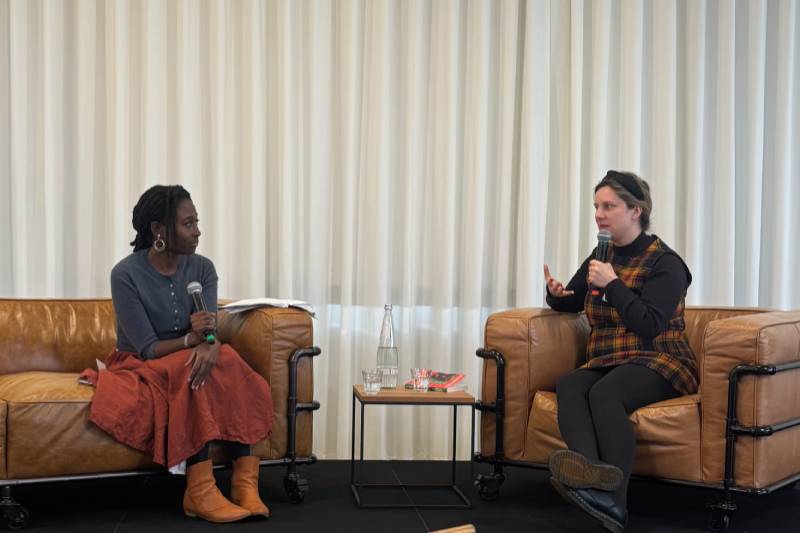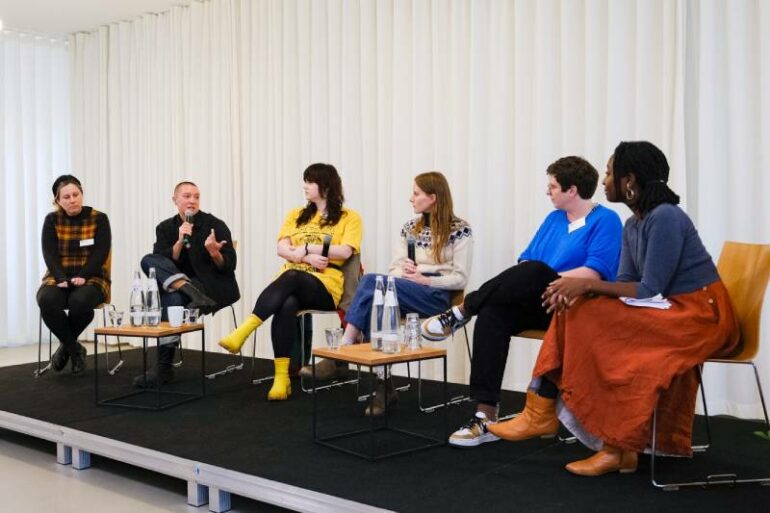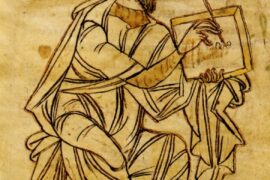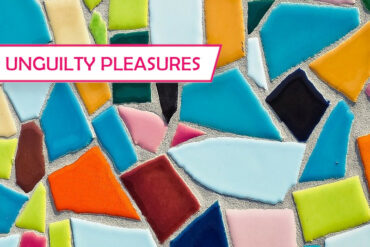From November 14 to 16, the British Council hosts the 38th Literature Seminar in Berlin, where attendees engage with »Granta Magazine’s Best of Young British Novelists«. Granta Magazine is known for its influential selection of emerging literary talents and highlights outstanding British authors every decade. Young writers present their works in insightful workshops and panel discussions chaired by Helen Oyeyemi.
By Anna Savchuk and Sofia Peslis
Picture: Alina Cherubin
The British Council Literature Seminar 2024, titled »JAM Yesterday, Tomorrow, and Today: New Adventures in Subjectivity«, offers a rich exploration of contemporary voices. Attendees, including literature enthusiasts, professionals, academics, and students, have the opportunity to engage with the works of British writers Camilla Grudova, Sarah Bernstein, Eliza Clark, K Patrick, and Eley Williams through workshops and panel discussions. These sessions are led by Helen Oyeyemi – herself an active participant in the 29th British Council Literature Seminar – and provide a thought-provoking platform to dive into themes of subjectivity and identity, sparking creative dialogue and new perspectives in modern literature.
A Deep Dive into Writing and Identity
Following the first two readings of the day, the panel discussion on November 15 brings a reflective shift to the event. Focusing on the interplay between subjectivity, public identity, and the act of writing, the session offers insights into the challenges and liberations of contemporary authorship. With panellists candidly exploring their creative processes, the audience engages in a dialogue on fear, transformation, and self-expression in literature, creating an introspective and inspiring conversation at the seminar.
The panel opens with a compelling discussion about the complexities of writing, where fear and pleasure intertwine. Eliza Clark observes that »this thing that was purely for pleasure turns into something that is filled with anxiety«, capturing the shift from private creation to public exposure, while Helen Oyeyemi describes being a writer as »someone with an unhealthy relationship with words«, revealing the consuming nature of the craft.
The speakers explore the tension between the attraction to writing and the external pressure of embodying the title of the »writer«. They confront the fear of judgement and misinterpretation but emphasize the liberation found in writing itself. This duality resonates strongly, providing a glimpse into the vulnerability and resilience inherent in the creative process. The panel discussion highlights the tension between public and private personas in writing, especially for marginalized voices – those whose perspectives are often excluded or undervalued in mainstream narratives. Panellists share how the anxiety of being »seen« through their work contrasts with the empowerment of shaping one’s own narrative. This is further explored through their diverse processes and motivations, with each speaker offering unique approaches to fiction – ranging from childhood storytelling passions to writing driven by anger or pleasure. These varying experiences resonate with the audience, providing valuable insights into the complexities of the creative journey.
The panel wraps up with a lively and imaginative exchange: if writing were divided into departments, which one would each author choose? Camilla Grudova leans into her love for language, selecting the »Similes Department«, while K Patrick embraces the power of structure with »First and Last Lines«, adding therefore that one gets two chances. Eliza Clark, ever the character-driven writer, claims »Characters«, and Sarah Bernstein chooses »The Vibes Department«, focusing on atmosphere. Eley Williams caps it all off with humour, declaring, »I’d be the janitor, let’s be honest – weeping that apostrophe out when it shouldn’t be there«. The setting creates an organic, intimate atmosphere, making the discussion feel more like a conversation among friends than a formal panel.
The Sounds of Literature
After the first three productive readings on Thursday, participants have the chance to attend workshops organised by each author, offering to create a closer connection to them. Unfortunately, each person can only choose two workshops, each with a maximum of 20 participants, which makes it a difficult decision since all five writers are welcoming, exuding a pleasant and outgoing energy that invites and intrigues everyone around them.
Sarah Bernstein’s workshop focuses on sounds and the auditory effects that literary works create to appeal to readers’ senses. She explores how the acoustic impact of literary works shapes a reader’s emotional and sensory experience, enhancing the text’s atmosphere, rhythm, and mood. During the workshop, participants test the theories discussed with Bernstein practice, observing how literary devices such as alliteration, assonance, repetitions, and rhythm form intriguing combinations. These combinations create curious chains of words that play with the readers’ minds or mimic real-life sounds.
Bernstein encourages creativity and imagination by first providing practical examples of auditory elements in literature and then guiding participants as they create their own work. 1.5 hours of the workshop pass very quickly, mainly because of Bernstein’s friendly presence, which makes the participants feel eager to contribute actively to discussions. Her ability to create a welcoming atmosphere fosters a sense of community among the attendees, making even the quieter participants feel comfortable sharing their thoughts. Bernstein’s genuine interest in everyone’s input keeps the conversation engaging and dynamic. By the end of the session, the participants are inspired to create their own pieces since the workshop boosts the overall creative process and gives a ground for fresh and unique ideas.
Sensory Storytelling
On November 16, the second workshop we took, titled »Surrealism and the Five Senses, the Two Columns of My Practice«, explores the creative potential of surrealism in crafting vivid, sensory-rich storytelling. Camilla Grudova has designed the session around engaging and thought-provoking exercises that encourage participants to expand their creative boundaries. Drawing on her expertise in art history and surrealist techniques, she begins by introducing the participants to the concept of sensory immersion in narrative construction. One particularly illuminating exercise involves analysing a picture with an emphasis on heightened descriptive detail. Attendees are urged to look beyond the obvious, paying close attention to the subtle elements that often go unnoticed. This practice aims to sharpen their observational skills and bring out the layers of richness often hidden in seemingly ordinary scenes.
In another playful yet profound task, Grudova asks participants to conduct an interview with a spoon. This unconventional exercise highlights the power of surrealism to evoke sensations and emotions, both in the writer and the reader, transforming everyday objects into vessels of deeper meaning.

Picture: Sofia Peslis and Anna Savchuk
A key takeaway from the workshop is Grudova’s insight into the impact of language and narrative depth. She illustrates this by contrasting a simple sentence like »Henry is sad and just wanted to be loved« with more textured, evocative writing. The lesson underscores how surface-level descriptions can fail to resonate, while deeper engagement with sensory and surreal elements can create stories that linger in the mind and heart.
Grudova‘s workshop is a highlight, inspiring participants with creative exercises that spark immediate bursts of imagination and leave attendees motivated to explore surrealism further. The session demonstrates the perfect balance of imagination and practical guidance, making it both engaging and memorable. However, the brevity of the workshops in general – coupled with the richness of the material and the participants’ enthusiasm – makes them feel a bit too short. This is particularly noticeable toward the end, where time constraints can leave discussions or activities feeling rushed.
Sticky, Sweet, and a Little Messy
The final discussion of the seminar marks the conclusion of the event, diving into fascinating perspectives on how contemporary writers and creators engage with media and culture. It is intriguing to see the diverse approaches authors take toward social media. Camilla Grudova and Sarah Bernstein for instance stay off social media, as they find it diminishes their inspiration for writing and evokes a depressive, addictive mood that hinders their creativity. In contrast, Eliza Clark draws inspiration from YouTube and Twitter »garbage«, as she describes it, using it in unconventional yet deeply personal ways to fuel her creativity.
The discussion highlights a shift from traditional cultural hierarchies to newer approaches, as many contributors curate influences from diverse sources, blending classical literature with modern and obscure stories. This dynamic underscores a rejection of monoculture in favor of unique, personal intersections of inspiration. This diversity offers unique and personalized pathways for inspiration. The differing attitudes toward media underscore the tension between maintaining an online presence for connection and preserving mental space for creativity. While online spaces provide community and exposure, they can also act as dopamine-driven distractions, slowing the process of meaningful, in-depth writing.
The writers also reflect on the feeling of being stuck in their work and emphasize the importance of flexibility. Embracing creativity without fear of being seen as odd or unconventional is vital to crafting authentic stories. As K Patrick notes, »I think that’s one of the biggest takeaways for me, to get flexible again, to embrace weirdness«. Patrick highlights how beginner writers often seek inspiration and rules from others, a tendency that stifles creativity and prevents the emergence of unique narratives.
The discussion circles back to the seminar’s overarching motto, »JAM, Yesterday, Tomorrow, and Today: New Adventures in Subjectivity«, tying the event’s themes together. The interpretation of the word »jam« sparks playful and thoughtful reflections, with Patrick humorously adding, »Well, my brain feels like it’s full of jam«, capturing the rich, sometimes overwhelming flood of ideas explored throughout the sessions. This layered metaphor embodies the essence of creativity – sticky, sweet, and a little messy – perfectly encapsulating the seminar’s spirit of embracing subjectivity and imaginative exploration.
You can find the second part of the conference report here.






